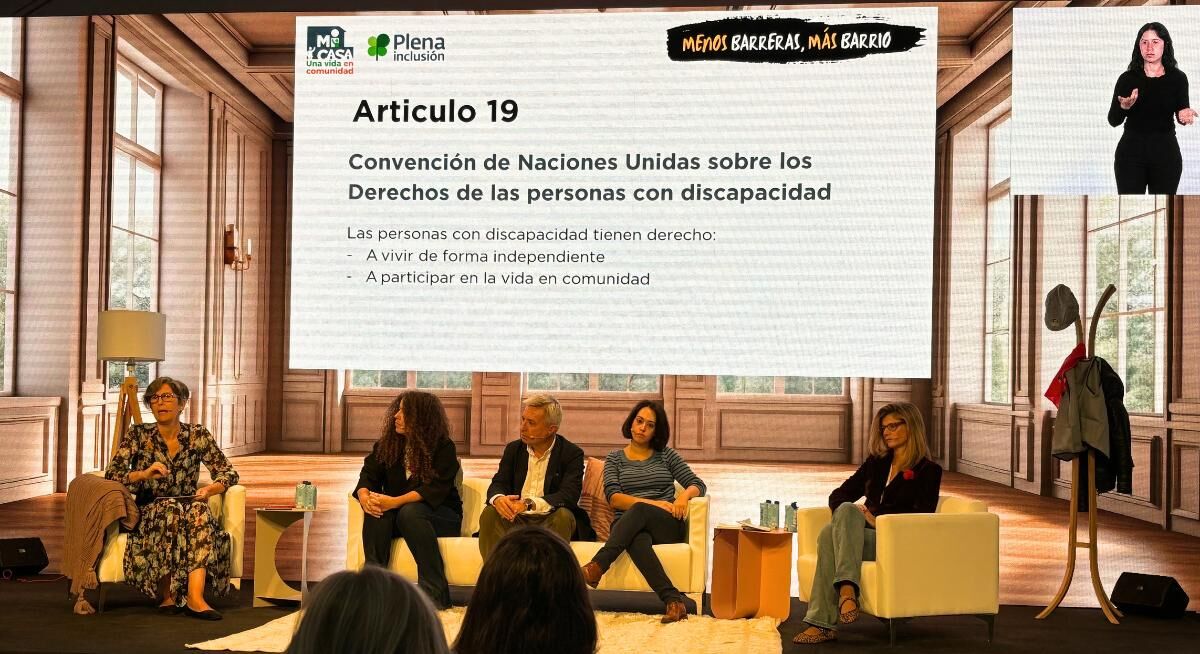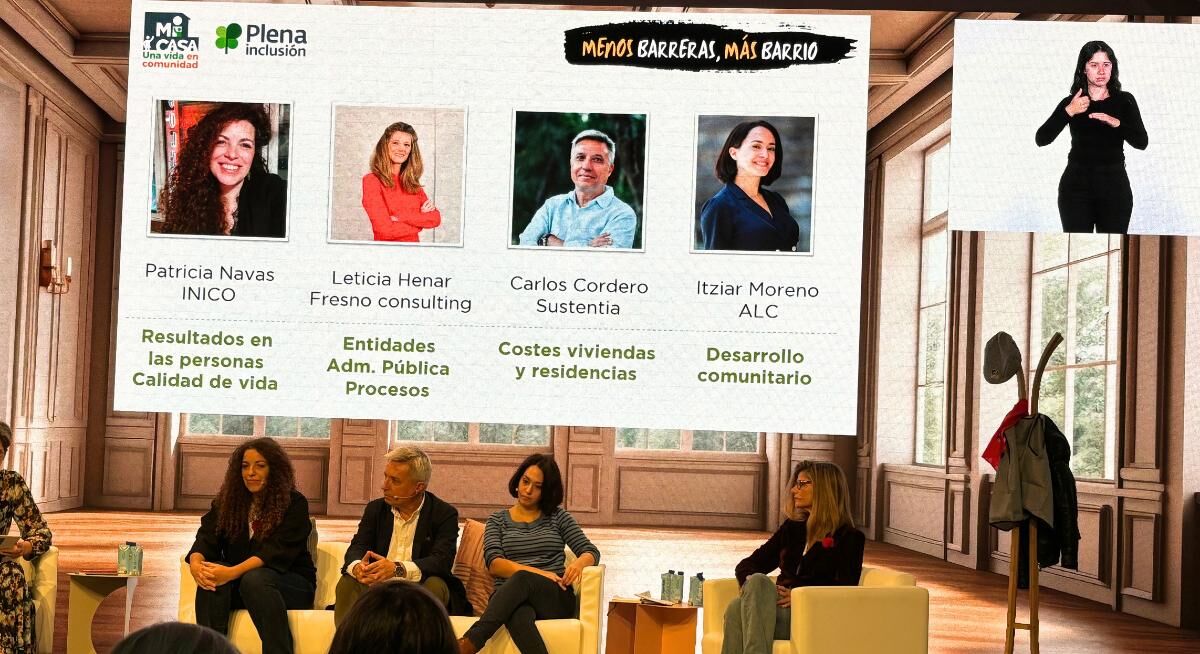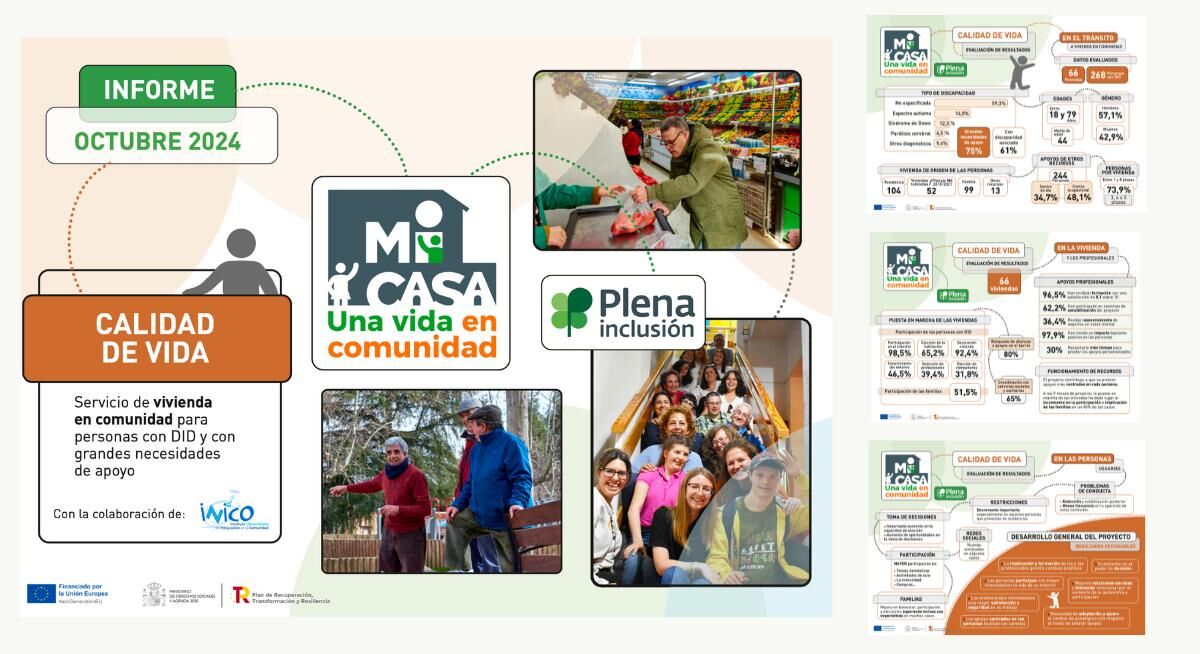The final conference of Plena inclusión's Mi Casa project marked an important step forward for human rights in Spain.
Author: Simon Duffy
In Madrid, on 24th and 25th October 2024 Plena inclusión held the closing conference for their Mi Casa: Una vida en comunidad [My home: a life in community] programme. It was an exciting and energising event which showcased the success of the project, shared the academic findings and set out the next steps to keep the deinstitutionalisation process moving.
Plena inclusión’s work is part of a wider commitment to deinstitutionalisation which is underpinned by support from the Spanish Government and the EU. Its approach has been dynamic, innovative and suggests a deep understanding of deinstitutionalisation. Too often countries focus on closing big buildings and moving people into smaller buildings, perhaps closer to their original homes, but often still quite institutional. Lives improve a little - but not in the way they should.
Also deinstitutionalisation is often merely a system change, restricted to just one of the labelled silos that dominate human services. So there might be change for people with ‘mental health problems’ but this is not treated as part of a wider social change. Thankfully Spain has not made this mistake. Spain is thinking deeply and broadly about the case for deinstitutionalisation. Not only Plena inclusión, but organisations like our partner Hogar Sí (working with people who are homeless) or FEDAIA (working with children and adolescents) are also working on deinstitutionalisation.
In essence I think what makes the Spanish approach to deinstitutionalisation distinctive is that they have learned from some of the mistakes other countries have made:
Plena inclusión’s approach has led the way in showing that deinstitutionalisation can lead to deep and powerful change. In particular their methodology combined:
Increasingly Plena inclusión have come to understand that there work must be work with community and this is beautifully captured in their slogan:
“Menos Barreras, Más Barrio”
“Fewer barriers - more neighbourhood.”
It was also very encouraging to see a much healthier relationship between research and action in this programme. Too often researchers become alien figures - parachuting into people’s lives, making judgements from a distance, not really understanding the challenges faced by people or organisations.
Sometimes researchers also impose the wrong value system on people, often some form of utilitarianism, rather than listening to what people say they really want. Critically, in this project, the researchers understood that this work is about human rights - and in particular Article 19 of the UNCRPD which underlines people’s right to independence and inclusion.

The full report will be published in a few months and so I will only indicate some of the findings here, but Patricia Navas, who led work on quality of life described the significant improvements in:
One person said:
“When you have freedom you can be a better person.”
Another commented:
“It gives me control of my life.”

It should be noted that housing options are still quite limited and group living is still the norm in this programme. Not everyone has been able to choose who they live with and this is something that self-advocates underlined in the event. Real housing rights need to be established. But people really like having a room of their own, learning how to do practical things and renegotiating how their relationships to work.
Families were also generally very satisfied with the changes and these included some people leaving their family home to live with friends.
The other research outputs were also interesting and important. It was particularly encouraging to see that the work of Leticia Henar and Fresno Consulting included a careful attempt to map the actual processes used to support people and create stronger communities. There was real attention to detail and an attempt to drive forward learning in a way that served the work.
Itziar Moreno described the detailed work done to understand the value of the community connector role. This included interviews with 658 people in order to understand the role and value of this intervention. Clearly community connection can be powerful:
This is important and also raises critical issues about how the whole of society needs to change and how this initiative connects to other necessary changes. Ms Moreno noted:
“Community connector work needs to sit within the wider social changes necessary for deinstitutionalisation… the ideal conditions are strong social capital and strong institutional support… and this takes time.”
For Citizen Network, as we explore what Neighbourhood Care means, this is an important point. As we move away from service silos we need to understand what these kinds of actions mean to the whole neighbourhood and how best to integrate these skills into the fabric of community life.
Carlos Cordero, who was studying the economics of Mi Casa described some of the complexities of understanding how costs change with deinstitutionalisation. But his conclusion was:
“Changing lives is viable and sustainable from an economic perspective and, from an economic perspective, the costs are not notably different.”
Most importantly of all Ms Henar reminded the audience that, whatever the obstacles, this change can happen:
“Don’t forget about your capacity to make this change - the change is manageable at every level - it has been possible to overcome the rigidities we face.”

At the end of the conference a range of leading political figures from central, regional and local government were brought into the Mi Casa house in order to host a discussion about the future prospects of deinstitutionalisation in Spain. The conversation was honest and passionate, people were clearly moved by the messages they had heard and their experiences in community. I was not able to keep track of which leader said what, but these are some of the key messages that struck me:
“This project cannot come to end. This has been an amazing project, as we see people come into community and take their place as neighbours.”
“This project shows the path we must follow: to be accessible in how we work and how we learn. We have path forward, we can’t turn back and we must think about how these principles apply to all our services.”
“Our town needs this project because the citizenry has welcomed this project and benefited from proximity, solidarity and community.”
“This idea of living apart is not right, it’s not normal. Now imagining new professional roles, like community connectors, is important. Small is beautiful, we need to develop eco-systems of care as we’re doing in the Basque country.”
“People with disabilities not only have the right to support, but they have the right to decide what kind of life they want to lead and we have the responsibility to help them lead it.”
“This project is very innovative, creates new figures, maps resources and works in partnership with the regional government.”
“We’re joining your revolution.”
“The experience in Edinburgh [on the Citizen Network study tour hosted by Radical Visions] was absolutely decisive. We were able to see the possibility of change for real.”
“The development of the facilitator and connector roles has been very important, and the training and supervision has been very conscientious.”
“Sometimes we confuse this flexibility in support with the loss of a worker’s rights. The job must not be treated as a certain number of tasks, instead the job needs to be flexible by design with the right skills and values. We need to recognise that the person has equal value and must be the king or queen of their own lives. The core question will be finding the right people with the right attitudes. We have to move away from a functional understanding of care work. It is about relationships in the context of the life of a household.”
“Power has to be redistributed and listening has to be central.”
“Trust is essential in order to work together.”
“We have to make sure all our spaces are accessible.”
“When we lived in a care home nobody ever rang our door bell to invite us to anything in the community.”
“Regulation has to be at the service of society, not society at the service of the regulations. That means we need to create new regulations. We need to leave behind the care home model and help people live in their own homes. If we appeal to the rights of people with disabilities we can push forward without waiting for new regulations.”
“Design housing according to the needs of people.”
“We can all work as connectors. We can put this on loudspeakers to reach everyone. We all have to help and be connectors. So we have to make city, town, village and neighbourhood as liveable as possible. Everyone has to be included in this revolution to make our places truly liveable for all.”
“Community connectors have confronted issues that have been long-standing problems in our communities, through careful listening events.”
“It is not really that much money, compared to the money that public bodies throw around. But this means we must be credible, and so we need to work with rigour.”
“We cannot achieve anything without social participation. These things need to be visible, in the streets… we need a specific plan - not just hopes and demands.”
“We invite people to participate, we need to work with media, this process of change needs to include and engage everyone.”
“We don’t need to wait for people to demand the change. We can there’s an injustice and we can do something about it. This needs to continue.”
“We’ve already done what’s difficult; only the impossible remains to be done. We can do it if we want to do it.”
But like all best parties Plena inclusión left the best bit to last.
They played this marvellous and heart-warming film:
I would like to take advantage of the opportunity that we have had on these days to meet the authorities and members of the different state, regional and local public administrations, managers of the Plena Inclusión’s associative movement and all professionals from the third sector... to tell you that we cannot forget and stop claiming that:
- We have the right to choose our life
- We have the right to affordable housing
- We have the right to live and participate in community
- We have the right to receive personalised support
- We have the right to have power and control over our lives.
People with intellectual disabilities are already doing our part:
- We have a state platform of representatives where we meet with politicians and demand our rights.
- We participate in our organisations and in the decisions that are taken.
- We are part of project working groups.
- We contribute to making our neighbourhoods more accessible and diverse.
The Plena Inclusión, associative movement, in its Strategic Plan: We win in community, sets out the roadmap for all people to be able to have a life of choice in community.
But we cannot do it alone.
We need the support of all of you: managers, boards, families and people in the public administration.
The responsibility is everyone's.
In Mi Casa we use the word "inalienable" a lot, and it is inalienable to keep moving forward with this project.
And as our 60th anniversary motto says: The difficult is done, the impossible will be done.
To conclude we will share the most important part of this project, which is the people, in the video.
Gracias Tere. Así es.
Gracias por estos 2 días de celebración y compromiso para trabajar el futuro.
Quiero aprovechar la oportunidad de que tenemos en estos días a las autoridades y miembros de las diferentes administraciones públicas estatales, autonómicas y locales, gerentes del movimiento asociativo Plena inclusión, profesionales del tercer sector…para deciros que no nos podemos olvidar y dejar de revindicar que:
- Tenemos derecho a elegir nuestra vida
- Tenemos derecho a una vivienda accesible
- Tenemos derecho a vivir y participar en comunidad
- Tenemos derecho a recibir apoyos personalizadosTenemos derecho a tener el poder y control de nuestras vidas
Las personas con discapacidad intelectual ya estamos haciendo nuestra parte:
- Tenemos un plataforma estatal de representantes donde nos reunimos con políticos y revindicamos nuestros derechos.
- Participamos en nuestras organizaciones y en las decisiones que se toman.
- Formamos parte de grupos de trabajo en los proyectos.
- Contribuimos a que nuestros barrios sean lugares más accesibles y diversos.
El movimiento asociativo Plena inclusión, en su Plan estratégico: Ganamos en comunidad, nos marca la hoja de ruta para que todas las personas podamos tener una vida elegida en comunidad.
Pero solos y solas no podemos.
Necesitamos del apoyo de todos vosotros y vosotras: de gerentes, juntas directivas, familias y las personas de la administración pública.
La responsabilidad es de todos.
En Mi casa usamos mucho la palabra irrenunciable, y es irrenunciable seguir avanzando en este proyecto.
Y como dice nuestro lema del 60 aniversario: “Lo difícil está hecho, lo imposible se hará.”
Para concluir vamos a compartir lo más importante de este proyecto que son las personas, dentro video.
Discover more, visit the Mi Casa website at: https://www.micasauvc.org/resultados-del-proyecto/
The publisher is Citizen Network Research. Celebrating the Success of Mi Casa © Simon Duffy 2024.
community, Deinstitutionalisation, Inclusion, intellectual disabilities, Neighbourhood Care, social care, Spain, Article